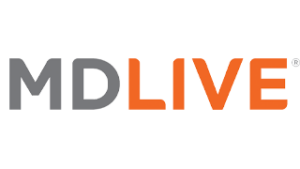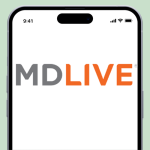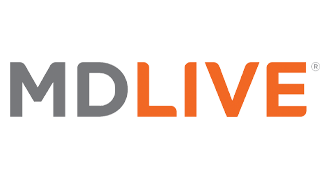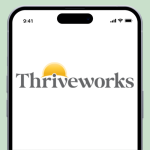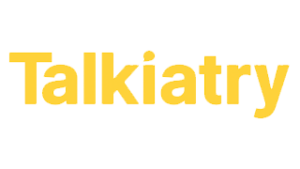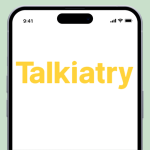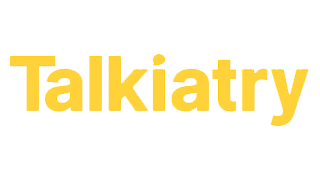Table of Contents
- We spent more than 10,000 hours researching over 70 online therapy and psychiatry platforms, and our testers signed up for the 20 most popular platforms to bring you our top picks.
- Our testers test each platform for at least two to four weeks, focusing on the sign-up process, provider selection, therapy session quality, and customer service interactions.
- We surveyed over 2,000 online therapy users, held focus group interviews with both users and therapists, and consulted over 60 mental health experts.
- We score each platform according to affordability, data privacy, availability, and inclusivity.
- Our pages are updated regularly to update pricing and service information and reflect our ongoing testing of new online therapy and psychiatry platforms.
- We examined whether each online therapy or psychiatry platform accepted insurance, including Medicare and Medicaid plans.
- Learn more about how we tested online therapy platforms.
Key takeaways
- Brightside is our best overall choice for an online platform that takes insurance because it offers patients the ability to work with both therapists and psychiatry providers, allowing both health care professionals to collaborate on patient care.
- Copays can be anywhere from $0–$60 per session, depending on your insurance plan and provider type.
- We spent more than 10,000 hours researching online therapy and psychiatry and continually consult with practicing experts to give you the most informed recommendations for the best online therapy that takes insurance.
Online therapy and online psychiatry are becoming increasingly popular for finding affordable mental health care with easy scheduling and shorter wait times. However, the cost of online therapy can still be a barrier for many individuals, as even the most affordable options may be out of reach without financial assistance. For those with coverage, finding the best online therapy that takes insurance can make these services more accessible to a wider range of people. Today, online platforms are partnering with health insurance companies—including large carriers like Aetna, Cigna, and Blue Cross Blue Shield—to provide talk therapy and psychiatry for the cost of a copayment, or copay, which can be as low as $20 or less.
People may seek online therapy for anxiety, depression, stress, or other mental health concerns, and those with insurance often specifically look for platforms accepting their provider. To help people with insurance find in-network providers, the Handbook Team researched 70 online counseling and psychiatry sites and found 22 platforms taking insurance. We evaluated each site according to several criteria—including appointment availability, overall cost, and ease of scheduling—to narrow our list to the six best online therapy and psychiatry platforms that take insurance. With insurance coverage, more people can access the mental health care they need without the heavy burden of out-of-pocket expenses.
Best online therapy and psychiatry services that take insurance
Here are our top platforms that accept insurance with large directories and low wait times:
- Brightside: Best overall
- Talkspace: Best provider network
- Zocdoc: Best for selecting your own provider
For specialty mental health care, we recommend these online therapy or psychiatry platforms that take insurance:
- MDLIVE: Best specialty care directory
- Thriveworks: Best for families
- Talkiatry: Best for medication management
Data privacy on mental health platforms
The Health Information Portability and Accountability Act (HIPAA) only protects the interactions and records between you and your provider during the visit. However, online mental health platforms may still collect data on their users to use for marketing or research. We recommend understanding how your data is collected and used before signing up for a platform. To do this and guard your private data in general, we recommend the following basic steps that we learned from the U.S. Department of Health and Human Services (HSS) and Mozilla Foundation’s *Privacy Not Included project:
- Attend your online therapy or psychiatry appointment in a private location, preferably not on a public Wi-Fi network.
- Use your personal computer when possible.
- Look out for checkboxes during sign-up to opt out of data tracking or medical information disclosure.
- Sign up with your email, not by using a social login like Facebook.
- Choose a strong password to create a secure account login.
- Review the platform’s privacy guidelines, typically found on the website’s Privacy Policy page, to understand whether and how the platform collects, stores, and shares private information.
There are many different options out there when it comes to online therapy services. Not every site offers therapist-matching services. Some simply serve as directories, where it’s up to you to search through the listings and connect with professionals. Other online therapy platforms allow you to apply search filters for factors like location, gender, faith, and age. Others have you complete an assessment and then pair you with a suitable therapist.
Collectively, the Handbook Team has invested more than 7,500 hours of research, testing, and evaluation to review different online therapy platforms, down to the fine print. We wrote this review to help you find a provider who best meets your mental health care needs.
Brightside: Best overall
Pros and cons of Brightside
Why Brightside is our pick for best overall
We love that Brightside, also called Brightside Health, has an integrated talk therapy and psychiatry plan for people age 13 and over. Brightside therapy sessions last 45 minutes, while psychiatry consultations last 30 minutes. We appreciate that Brightside has online psychiatry and therapy in all 50 states, and you can have medication shipped to you directly. Brightside also offers excellent cost transparency, with all of its fees clearly listed.
Brightside also stands out because with the Psychiatry + Therapy plan, your therapist and your psychiatry provider can communicate directly and see previous session notes to align their care for an individual user. This can make your appointments more productive because you won’t have to catch one provider up on the details of what you discussed with the other provider.
Like Talkspace, the Brightside platform will match you with a therapist or psychiatrist based on your responses to a questionnaire. First, the platform will ask about your mental health concerns. Then, you’ll take a short (about one minute) assessment based on those concerns. Unlike Talkspace, Brightspace requires creating an account before seeing pricing information or determining your coverage. The registration process only takes a few minutes, but we prefer the more transparent approach taken by Talkspace. Our testers also found the Brightside intake process took much longer than the Talkspace process and included more questions. Signing up for Talkspace took about 20 minutes for one of our testers, while signing up for Brightside can take up to an hour.
Brightside offers treatment for a wide range of mental health conditions, including bipolar disorder, insomnia, post-traumatic stress disorder (PTSD), and phobias. Its psychiatric providers can prescribe a variety of medications for treating anxiety and depression, including Abilify, Cymbalta, Prozac, and Zoloft. They do not prescribe controlled substances like Klonopin or Ritalin, which are medications that can be helpful for people who have anxiety or attention deficit hyperactivity disorder (ADHD). It may be helpful to seek in-person psychiatric evaluations to discuss whether these medications would be most appropriate for your case.
We know many people benefit from a combination of talk therapy and medication. So we appreciate Brightiside’s combined Psychiatry + Therapy plan, which offers four monthly video sessions with a therapist, a personalized medication plan, and regular medication check-ins with a psychiatrist. Knowing that your therapist and psychiatry provider can communicate and coordinate your care through the platform is a big benefit of this Brightside plan.
While we appreciate that Brightspace offers Crisis Care for anyone at elevated suicide risk, we want to reiterate that anyone currently having suicidal thoughts or considering self-harm should call the 988 Suicide and Crisis Lifeline at 988.
We chose Brightside as our best overall pick in our review of the best online psychiatry platforms.
Who may like Brightside: Brightside is a good choice for people who want to receive online therapy and online psychiatry on one platform. Its providers can coordinate your care and message with you on the same platform.
Who may want to avoid Brightside: Brightside isn’t a good fit for people under the age of 18 and those who may have severe mental health symptoms or certain co-existing health concerns. Brightside doesn’t treat the following populations: people who engage in ongoing, high-risk self-harm; have schizophrenia or symptoms of psychosis; have bipolar disorder I or are experiencing acute mania; have severe substance use disorder; have medically unstable eating disorders; or have kidney disease, liver disease, seizures, or cardiac arrhythmias.
Brightside tester insights
Our Brightside tester decided to switch therapists after their second appointment and reported switching to a new provider was relatively simple. After contacting customer service, they sent them the profiles of seven therapists. Our tester liked the diversity of choices they were given and that it was a seamless transition of care once they chose a new provider to start with.
From one of our Brightside testers:
“There were people of color and a male included, so I appreciated the diversity of therapist options.” Our tester also liked that the platform shares notes between therapists, so they weren’t “starting from ground zero” with their new provider.
Brightside also offers a series of self-care lessons that teach users emotional regulation skills through short videos and articles. Our tester appreciated this added resource that their therapist could recommend as a complement to their therapy sessions on the platform.
According to our tester, the Brightside app was convenient and made their care a seamless experience. In addition to the self-care lessons, users can attend sessions through the app and check in with their symptom tracker as well. Read more about Brightside’s app and other similar apps in our review of the best mental health apps.
What other Brightside users say
In our survey of 100 Brightside users in February 2024, we learned that 83 percent of respondents used their insurance to help pay for their mental health care on the platform.
Since Brightside helped match their users with providers, we wanted to know whether users were satisfied with their therapist match process. Survey respondents indicated they were looking to be matched with therapists who shared their gender identity. We also learned 73 percent of respondents had therapists who shared a part of their identity (e.g., gender, sexual orientation, religion, ethnicity) and 83 percent of respondents were satisfied or very satisfied with the therapist they were matched with.
Read our in-depth Brightside review for additional details.
Talkspace: Best provider network
Pros and cons of Talkspace
Why Talkspace is our pick for the best provider network
Talkspace boasts a provider network that includes over 5,000 licensed therapists. The platform’s providers are from all 50 states and are trained in over 40 specialties. Additionally, we like that Talkspace prioritizes cost transparency, making it easy to check your insurance coverage and find out how much you’ll have to pay per session. While Talkspace therapy sessions last 30 minutes, which is less than most other online platforms and in-person therapy, its services are available in all 50 states, plus Canada. One of the features we find helpful on Talkspace is the ability to text your therapist between sessions. Providers typically respond within 24 hours during their scheduled hours on the platform.
Talkspace therapists treat a wide range of mental health needs. According to its website, Talkspace therapists and psychiatrists specialize in more than 150 conditions, including depression, anxiety, anger management, grief, obsessive-compulsive disorder (OCD), postpartum depression (PPD), and bipolar disorder.
While the platform serves individuals 13 and older, we especially like its focus on teens. In 2022, one in four teens were diagnosed with a mental health condition. Online therapy platforms like Talkspace can help make therapy more accessible for young individuals who may have transportation issues.
Talkspace psychiatry plans also accept insurance coverage, with an average copay of $30 per session. We like that you work with the same provider throughout your treatment, from your initial evaluation through subsequent follow-up visits. We also like that you use the Talkspace app to schedule, manage, and attend both your online therapy and online psychiatry sessions.
Who may like Talkspace: Talkspace is a good choice for people over the age of 13 looking for online therapy or psychiatry covered by insurance. It’s also great for people who prefer messaging their therapist between their sessions because Talkspace includes its messaging feature with each of its plans.
Who may want to avoid Talkspace: Children under the age of 13 looking for online therapy won’t be able to use Talkspace. People with severe mental health symptoms, complex conditions, or who haven’t had their mental health symptoms diagnosed may benefit more from in-person care.
Talkspace tester insights
Many Talkspace providers are in-network with major insurance carriers like Aetna, Blue Cross Blue Shield, and Cigna. We know cost can be a barrier for many people searching for mental health care, and a lack of transparency about pricing can make the search more stressful. With Talkspace, you can find out how much you’ll have to pay before you even create an account.
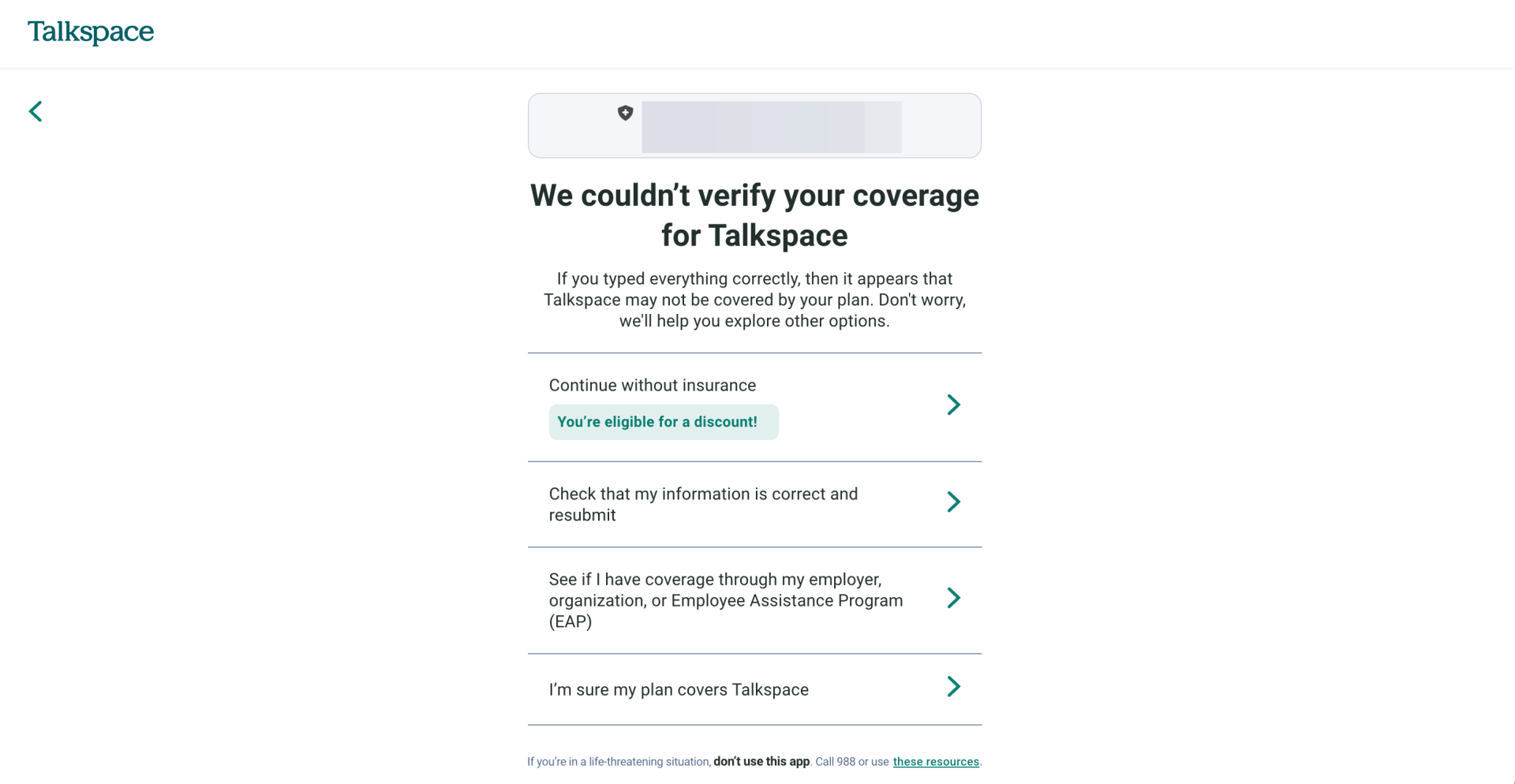
Once you’ve determined coverage and cost, Talkspace will match you with a therapist or psychiatry provider based on your mental health concerns and gender preferences. If you don’t relate well with your initial provider or their schedule doesn’t sync well with yours, you can switch relatively easily, according to our testers. Talkspace works to make selecting your therapist simple. Therapist profiles include a video introduction, a short biography, focus areas, experience level, and availability.
From one of our Talkspace testers
“When switching therapists, you can see a graph of their platform activity to get a sense of how active a therapist is by day and hour. This helped me choose my therapists according to when I’d like to engage with therapy.”
What other Talkspace users say
Of our 2023 survey respondents who used Talkspace, 70 percent thought live video sessions were the most important form of online therapy, and 36 percent chose live chat as their favorite way to communicate with a therapist. If messaging your therapist is a feature that matters to you, as it was with our testers, be aware that you may need to switch therapists to find someone highly responsive to messaging.
In the same survey, 81 percent of respondents used their insurance coverage to help pay for Talkspace, and 90 percent agreed that they received good value for what they paid on the platform. Sometimes, insurance verification and billing can be complicated, and multiple calls may be required between you and your provider and insurance administrator. For most of the Talkspace users we surveyed, billing complications weren’t an issue. In fact, 73 percent of respondents shared that they didn’t encounter billing issues when using the platform.
Read our in-depth Talkspace review for additional details.
Zocdoc: Best for selecting your own provider
Pros and cons of Zocdoc
Why Zocdoc is our pick for best for selecting your own provider
Zocdoc offers an extensive directory with photos and biographies to help you select a therapist or psychiatrist who takes your insurance. The directory’s filter tool includes gender, languages spoken, and areas of specialty. We like that Zocdoc offers you the ability to select your own provider based on your insurance coverage and the type of mental health services they provide. With Zocdoc, the length of your therapy session will vary depending on your specific provider. Zocdoc offers ample flexibility, so users can easily cancel appointments and switch providers.
Hundreds of insurance carriers, including Medicare and Medicaid, are represented on Zocdoc. Once you enter the condition you need help with or the service you’re seeking (e.g., “therapy”), your zip code, and your type of insurance, you’ll be shown a list of in-network providers in your area. From there, you can see all available appointment times, including the type of sessions available (video or in-person). You can also filter your results by gender, language spoken, faith, ethnicity, treatment approaches, and more. Be aware that Zocdoc leaves it to providers to update their information, so some profiles may be more up-to-date than others.
When you do select a provider through Zocdoc, know that you won’t meet with them on the Zocdoc platform. Instead, the provider, or their office, will reach out to you directly to set up your appointment and the details of the video platform they use, like Zoom or Google Meet.
Zocdoc is a great option for people seeking mental health care who want to pay per session instead of signing up for a subscription, or who want to read detailed provider profiles and reviews before setting up an appointment.
Who may like Zocdoc: Zocdoc may be a good choice for people who like to choose their own providers and filter them by their specialty. It’s also a great platform to find other providers who can support your mental health care, such as primary care providers.
Who may want to avoid Zocdoc: If you’re overwhelmed with the choice of providers on Zocdoc, you may want to consider Brightside or Talkspace, which match you with an online therapy or psychiatry provider based on your preferences. Users on Brightside, Talkspace, and Zocdoc can still switch providers anytime to find the right fit.
Zocdoc tester insights
While booking online with Zocdoc is easy, we like the fact that you can also book through its customer service number (855-962-3621). Our tester’s customer service representative was friendly and knowledgeable, and there was zero on-hold time.
Because of the wide range of providers on Zocdoc, same-day appointments for online therapy or psychiatry are often available, although confirmation of appointment times depends on the provider’s responsiveness. We found a lag in appointment confirmation, which sometimes meant providers weren’t available for the same-day or next-day appointments listed on the platform.
From one of our Zocdoc testers:
“If you’re looking for a true directory where you can easily search for medical professionals in any field, Zocdoc is a great choice. If you want a platform with lots of bells and whistles, an app, extras, and special features, I would recommend trying one of the more ‘classic’ online therapy platforms, like Betterhelp or Talkspace.”
What other Zocdoc users say
According to our February 2024 survey of 100 Zocdoc users, respondents who used Zocdoc to find a mental health care provider most often also booked with a primary care physician. From the same survey, we found 87 percent of respondents used insurance to pay for their online therapy and 96 percent said they were satisfied or very satisfied with the providers they chose through the platform.
Read our in-depth Zocdoc review for additional details.
MDLIVE: Best specialty care directory
Pros and cons of MDLIVE
Why MDLIVE is our pick for best specialty care directory
MDLIVE has a directory of more than 2,400 board-certified and licensed therapists, with appointments in one to two days for therapy and two to three days for psychiatry. We like the platform’s highly specific filter, which helps you find a provider with an area of focus that matches your needs. Therapy sessions through MDLIVE typically last 45–60 minutes. The platform allows you to choose your provider and verify your insurance. MDLIVE is available in all 50 states and Puerto Rico.
After providing you with a list of your in-network providers, the platform allows you to filter by gender, area of specialty, language, and type of session (phone or video). Our testers like the ability to filter by dozens of categories, including ones we haven’t seen on other platforms. Some of the categories listed include:
- Level 1 autism spectrum disorder (formerly known as Asperger’s).
- Chronic illness.
- Men’s issues.
- Pregnancy/infertility.
- Racial identity.
- Video game addiction.
- Weight loss.
Like Zocdoc, MDLIVE has a large directory of in-network mental health care providers. You will need to register for an account, enter your insurance information, and answer a series of questions about your mental health concerns before you can access its provider directory. Unlike the other online therapy platforms we tested, MDLIVE requires you to provide a short medical history before viewing the directory.
We like that MDLIVE offers next-day appointments for therapy that are covered by insurance in some cases. There are providers with evening and weekend appointments available, too, to help make time for your mental health in a busy schedule. We also like that the platform’s website clearly outlines what its providers treat and also clarifies the conditions for which they do not provide care. For example, MDLIVE providers cannot prescribe ADHD stimulant medications, and they will not treat individuals experiencing active psychosis or active medical detox from substance use.
MDLIVE has its own app, which you will use to find providers, schedule appointments, and attend your therapy or psychiatry sessions.
Who may like MDLIVE: MDLIVE has providers to treat many mental health conditions, including addictions, anxiety, bipolar disorder, trauma, and stress management. It’s a good choice for those looking for next-day appointments covered by insurance.
Who may want to avoid MDLIVE: MDLIVE doesn’t have other ways of connecting with your provider, such as anytime messaging or text-based live sessions. It also doesn’t treat individuals with select mental health needs and requests, including those who:
- Are in an emergency or crisis situation.
- Are requesting stimulants for ADHD prescriptions.
- Are experiencing active psychosis.
- Are in active medical detox for substance use.
- Have been diagnosed with moderate to severe autism spectrum disorders.
- Are under the age of 10.
- Have been diagnosed with any condition or combination of mental health conditions that prohibit the ability to perform normal day-to-day activities.
Additionally, MDLIVE does not complete requests to complete paperwork or prefilled forms (e.g., Family and Medical Leave Act forms).
MDLIVE tester insights
Though it can be time-consuming to read through dozens of provider profiles, the MDLIVE directory was easy to navigate, and the filters helped narrow our search to providers who met our specific needs.
Our Handbook Team tester was able to find an appointment time the next day after noticing that the appointment time wasn’t there before. Unlike on Zocdoc, provider schedules on MDLIVE are updated frequently and can show last-minute availability due to canceled appointments.
From one of our MDLIVE testers:
“I was able to set up an appointment for a day later, which was great. When I previously checked availability, the time slot I took was not there at first, meaning that MDLIVE does a good job of updating its appointment slots in a timely manner.”
What other MDLIVE users say
MDLIVE users from the Apple app store rated it 4.7 out of 5 stars. Some found the platform challenging to navigate at first, encountering technical issues, but overall appreciated the convenience of attending therapy online: “At first, I found the technical aspect of learning how to navigate the website very challenging … I love the fact that I’m safe at home when I’m talking about my trauma and that I don’t have to drive home with tears running down my face trying to drive while trying to get myself together.” Users from the Google app store rated the platform similarly at 4.6 out of 5 stars and cited technical issues with the app itself.
We recommend testing your connection and app settings before your first visit if you’re using the MDLIVE app to avoid any disruption to your appointment time.
Read our in-depth MDLIVE review for additional details.
Thriveworks: Best for families
Pros and cons of Thriveworks
Why Thriveworks is our pick for best platform for families
Thriveworks provides mental health care for the entire family through individual, couples, or family sessions. Family therapy can be helpful for families where one or more members are affected by mental health concerns such as addiction or depression. Family therapy can help improve family relationships and teach family members how to support each other through healthy behaviors and interactions.
Thriveworks also offers couples therapy for parents or partners to strengthen their relationship skills. Read our review of the best online couples counseling platforms to learn about other options for couples.
Unlike many online therapy platforms, Thriveworks offers counseling to children of all ages. So, in addition to offering online family therapy, Thriveworks also has the option to treat children and adolescents who may be struggling with their mental or behavioral health.
We love that Thriveworks offers longer sessions than other mental health platforms mentioned in this article. Each session on the platform lasts 50–60 minutes.
Who may like Thriveworks: Families with busy schedules may find it convenient to attend family therapy or individual therapy online with Thriveworks. It can be a good choice for children and adolescents struggling with behavioral or mental health issues since their providers treat children of all ages.
Who may want to avoid Thriveworks: Thriveworks’ self-pay costs are higher than those of other platforms we mention in this article. If you’re not in-network with the platform’s providers, you may want to look into other affordable online therapy platforms. Our testers found that Thriveworks therapists aren’t available in every state. If you’re in the following states, you may not be able to find a therapist, or your choices may be limited: Georgia, Hawaii, Idaho, Iowa, Kansas, Kentucky, Minnesota, Montana, Nebraska, Nevada, New Hampshire, New York, North Dakota, South Dakota, Utah, Vermont, West Virginia, Wisconsin, and Wyoming.
Thriveworks tester insights
Like Zocdoc, Thriveworks is a directory of providers. We found it was easy to find in-network providers by clicking “Find a Provider” on the homepage. From there, enter your location, the specialty you want help for (e.g., trauma), and your type of insurance. If you don’t have insurance, select “Self-pay/out-of-pocket.” Our tester was able to find a provider they wanted to work with without having to go through a lengthy intake process.
From one of our Thriveworks testers:
“I was able to browse through all the therapist options and choose one before even making an account.”
Though the platform says that it offers counseling in 49 states, including Washington, DC, our testers couldn’t find an available provider in the following states: Idaho, Kansas, Kentucky, Minnesota, Nebraska, New Hampshire, New York, North Dakota, South Dakota, Utah, Vermont, West Virginia, and Wisconsin. In addition, some states may have limited choice of providers. For example, we only found one therapist available in these states: Georgia, Hawaii, Iowa, Montana, Nevada, and Wyoming.
What other Thriveworks users say
Thriveworks is rated 4.4 out of 5 stars from Google reviews of its nationwide locations. Positive reviews mostly praise the platform’s therapists for offering helpful and effective care. Negative reviews mention issues with billing and resolving billing issues with customer service.
Read our in-depth Thriveworks review for additional details.
Talkiatry: Best for medication management
Pros and cons of Talkiatry
Why Talkiatry is our pick for best for medication management
Talkiatry provides online psychiatry services, with a particular emphasis on medication management and extensive provider flexibility in appointment scheduling. Their standout feature is that their providers can prescribe controlled substances for certain conditions. This means users may have access to more potential treatment options than through other online psychiatry platforms. The types of medications providers can prescribe will depend on the telehealth prescribing laws where you live. The lack of live messaging sessions and a mobile app might be limiting for some users seeking these features. Talkiatry psychiatrists can also refer you to a Talkiatry therapist if they think it is appropriate for your treatment, but you must already be working with a Talkiatry psychiatrist first.
Talkiatry provides an accessible and convenient way to connect with a psychiatry provider. The matching process is straightforward, with Talkiatry automatically pairing patients with a provider based on their intake form information. We were matched with psychiatrists specializing in OCD, PTSD, and anxiety. Although changing providers isn’t directly available through the portal, contacting support allows for adjustments.
Appointments are easy to schedule through the portal and are typically booked during current sessions or requested separately. While initial appointments last about an hour, follow-ups are generally around 30 minutes. We appreciate that Talkiatry offers extended operating hours Monday through Friday from 8 a.m. to 8 p.m. and on Saturdays from 8:30 a.m. to 5 p.m., providing ample flexibility.
Who may like Talkiatry: Talkiatry is a good option for people looking for online psychiatry sessions. Unlike Brightside and Talkspace, Talkiatry providers aren’t limited to what they can prescribe, so you can get the medication therapy that’s best for you, depending on the telehealth prescribing laws where you live.
Who may want to avoid Talkiatry: Talkiatry doesn’t treat people with certain conditions. If you’re one of the following, consider connecting with an in-person psychiatry provider instead: An individual who is at risk of self-harm, requires in-person treatments, has been hospitalized for a mental health condition in the last six months, or has been diagnosed with schizophrenia or an eating disorder. Those interested in exploring therapy without medication will also want to look at different options.
Talkiatry tester insights
Our Talkiatry tester liked the comprehensive nature of the care they received from their online psychiatry sessions. They were sent to get lab work before a follow-up visit, and communications with the provider were made easier with the provider messaging portal. This made them feel confident in the thorough process their provider went through to make sure any medication prescribed was appropriate.
From one of our Talkiatry testers:
“One of my psychiatrists requested a full lab panel so she could see what my current test results showed regarding my health to help with medication management. That was through Quest Diagnostics, and it was a very easy process. I really appreciated that they had the option to do this and it stays in my medical history on the platform.”
What other Talkiatry users say
In our February 2024 survey of 100 Talkiatry users, 87 percent of respondents shared that they were satisfied or very satisfied with their psychiatry provider on the platform.
Read our in-depth Talkiatry review for additional details.
Important insurance tips for online therapy
Many of the online platforms we recommend take on the task of checking your coverage and determining how much you’ll have to pay for therapy. Still, we recommend understanding the following insurance terms:
- Copay: Short for copayment, a copay is the fixed amount you pay for a covered health care service, usually at the time of service.
- Coinsurance: Your share of costs for a covered health care visit, calculated as a percentage (for example, you might pay 20 percent, and your plan pays 80 percent).
- Deductible: The amount you must pay toward covered health care services before your health insurance plan begins to cover payments.
If possible, call your insurance provider and ask them to define these terms for your specific policy. Here are some questions to help guide your conversation:
- What are my copayment and coinsurance amounts for mental health care?
- What is my copay for talk therapy sessions?
- What is my copay for psychiatry sessions?
- What is my deductible for in-network mental health care? How much of my deductible has already been met?
Other online therapy and psychiatry platforms that accept insurance to consider
We tested several platforms to find the best online therapy and psychiatry platforms that take insurance. These platforms didn’t make our top six, but they may work well for your needs.
Charlie Health provides personalized mental health care for teens and young adults. Their primary offering is intensive outpatient care, intended for those who need more than weekly support from a therapist, which is why it didn’t make our list of best online platforms.
Clinical mental health providers at Charlie Health use art and music therapy, drama therapy, cognitive behavioral therapy, and other evidence-based approaches. We like the fact that Charlie Health accepts many large insurance carriers, including Medicaid.
Charlie Health key takeaways:
- Virtual intensive outpatient program (IOP) for teens and young adults struggling with mental health issues.
- Nine to 12 week intensive program that includes individual, group, and family therapy tailored to the individual’s needs.
- Accepts insurance, including United Healthcare, Aetna, Cigna, Humana, Blue Cross Blue Shield, Optum, Tricare, and Medicaid.
- Operates in 34 states.
Charlie Health is an option to consider for teens who need more intensive support for their mental health. Unlike online therapy visits offered on other platforms, the intensive program from Charlie Health requires nine to 11 hours of sessions a week, including three 50-minute group sessions.
While researching Charlie Health, our tester found their customer service to be very responsive:
From our Charlie Health tester
“They said I’d be contacted in the next couple of hours, but I received a text within 10 minutes from what seemed to be a real person.”
Like Zocdoc and MDLIVE, Headway is an online service connecting therapy and psychiatry seekers with mental health care providers who accept their insurance. Its providers offer talk therapy, psychiatry, and medication management for adults and children ages six and older. All providers on this platform accept insurance.
While our testers had success finding providers on Headway, they found it challenging to contact the platform’s customer support.
Headway key takeaways:
- Providers are in-network with plans such as Aetna, Anthem, Cigna, UnitedHealthcare, Oxford, and Oscar.
- Input your insurance information to get a cost estimate.
Our tester appreciated Headway’s cost estimate feature. After entering their insurance information, they were able to get a per-session cost estimate, which helped them understand their financial responsibilities before booking.
From our Headway tester
“I like Headway’s insurance estimate tool because it gets you a cost estimate, not just whether the providers accept your insurance or not. Seeing my estimate gave me more certainty about proceeding with booking an appointment.”
Monument is an online therapy platform specifically for people who want to quit or cut back on drinking. Its medication-assisted therapy program includes talk therapy, management of medications used to treat alcohol use disorder, and moderated support groups. It also offers a community support forum.
Monument accepts Aetna, Cigna, Medicare, and other insurance plans. Its insurance verification specialists will help you determine your coverage.
Monument key takeaways:
- Community membership costs $14.99 monthly, which includes access to support groups, a 24/7 anonymous community forum, an SMS-based drink tracker, and daily affirmations.
- Specialist therapist and physician visits with medication-assisted treatment are available as an add-on to the community membership for $100 per appointment without insurance.
- Specialized therapy can also be added to a community membership. It includes virtual appointments and messaging anytime with your therapist. Therapy visits cost $149 per month for two sessions a month and $249 per month for four sessions a month without insurance.
While the community membership is open to everyone, Monument is limited to providing therapy and medication-assisted treatment in the following states: Arizona, California, Colorado, Connecticut, Florida, Georgia, Iowa, Kentucky, Maryland, Michigan, Mississippi, New Jersey, New York, North Carolina, Ohio, Oregon, Pennsylvania, South Carolina, Texas, Virginia, Washington, and Washington, DC.
Physicians can only prescribe naltrexone and disulfiram to treat alcohol use disorder, but it’s important to know that there are other options for medication therapy that may be better suited to you Consult with a medical professional to see whether these medications or others are most appropriate for you.
Our tester had a positive experience with Monument’s group sessions included in its community membership:
From our Monument tester
“There was a lot of support and compassion in the group. It was very uplifting to hear and a great motivator for the start of the week. I do think that this could be a great option for people who are super passionate about group therapy.”
How we test and choose the best online therapy and psychiatry platforms accepting insurance
The Handbook Team researched over 70 online therapy and psychiatry platforms, directories, and networks. We note which platforms take insurance, the plans that they accept, and how its users are billed. Based on our research, we signed up for the top 20 platforms to test out for ourselves.






First-hand testing experience
Our testers are instructed to test the platforms through the lens of a real user, paying attention to how easy or difficult it is to find a therapist or psychiatrist they could talk to. Testers explore the platforms and attend online therapy or psychiatry sessions for at least two to four weeks. Our testers note any features, bugs, or perks they discover while testing the platforms and how that impacts the mental health journey of a user.
Additionally, having testers throughout the United States allows us to gauge the availability of providers in different locations. We look for platforms that have flexible appointment times and wider availability so that busy individuals can find a time that suits their schedules. We also evaluated whether platforms factored in inclusivity and diversity into their user experience, including specific filters or questionnaire questions that helped individuals find providers with a certain identity. Testers logged their experience in a diary and came together to share their findings when testing concluded.
Online therapy surveys
We received survey responses from over 2,000 online therapy and psychiatry users in varying age groups. These surveys asked current users of popular online therapy and online psychiatry platforms to evaluate each service based on factors such as their satisfaction with, availability of, and diversity of therapists on the platform. In addition, we learned whether each platform’s features were important to a user or not. Their feedback taught us firsthand how users leverage each platform’s unique features and helped us learn how users feel about important issues such as data privacy.
Focus groups
We hosted focus groups of practicing online therapists and current online therapy and psychiatry users to understand what each group values on their side of the screen. We asked the therapists about the pros and cons of teletherapy and learned what factors influence online therapy and psychiatry users to choose one platform over another.
Affordability and insurance
We further evaluate a platform’s affordability and payment options in order to understand the financial commitments a user would make on each online therapy platform. We looked for platforms with affordable out-of-pocket prices and wide insurance networks. We noted where platforms offered financial aid, sliding scale fees, or different tiers of memberships that could fit in different budgets.
Mental health experts
A group of seasoned mental health professionals offered insight on online therapy and psychiatry platforms for this article, helping us ensure that it contains up-to-date information and expert knowledge. We ask experts how their patient’s insurance may limit or enable mental health care, in addition to other factors consumers may consider when looking for online mental health support.
Learn more about our online therapy testing and review methodology.
Our online therapy and psychiatry testing process
In a mental health emergency
Online mental health providers may not be the most appropriate resource to help in a mental health crisis. If you or someone you know is a danger to themselves or others around them, it is an emergency, and cannot wait for an online provider’s response.
Don’t wait. You can find help immediately by:
- Visiting urgent care, the emergency department, or calling 911.
- Calling or texting 988 for the Suicide & Crisis Lifeline.
- Chatting online at 988lifeline.org.
- Calling the Substance Abuse and Mental Health Services Administration (SAMHSA)’s Helpline at 800-662-4357 or text your zip code to 435748.
All of the above options will connect you with trained professionals who can provide crisis support. You can find even more resources, including international options, on our helpline directory page.
How to know if your insurance covers online therapy and psychiatry
Many online platforms have tools to help you check whether your insurance plan is in-network and offer guidance to understand your plan’s mental health benefits. You can also contact your insurance company directly by calling the number on your insurance card. A representative will be able to answer questions about your benefits and whether online therapy might be covered.
Here’s a top-level glance at what some of the major insurance companies offer, but you’ll still want to call and confirm what’s covered in your exact plan:
- United Healthcare: United Healthcare covers Talkspace and any other online therapy as long as the therapist is in-network.
- Aetna: Aetna members can receive online therapy through MDLIVE, Teladoc, Talkspace, and other in-network therapists.
- Humana: Humana plans cover online therapy from in-network professionals.
- Blue Cross Blue Shield: Blue Cross Blue Shield plans cover online therapy through Amwell and other services, depending on your specific plan. In-network professionals are also covered.
- Anthem: Anthem members have access to therapy from Anthem’s own telehealth service, LiveHealth Online, and care from in-network professionals.
- Cigna: Cigna covers Talkspace and any other in-network online therapy services.
- Kaiser: Kaiser covers online therapy from in-network professionals.
Is online therapy covered by Medicare or Medicaid?
Some of the best online therapy and psychiatry services accept Medicaid and Medicare, but not all platforms are open to these forms of insurance. We suggest checking insurance coverage before signing up. Our choice for best comprehensive care, ZocDoc, accepts both Medicaid and Medicare. In select states, Brightside, MDLIVE, and Thriveworks accept both of these forms of insurance as well, but Talkspace and Talkiatry only accept Medicare in select states.
Other ways to save money on online therapy and psychiatry
In addition to accepting insurance, some platforms offer services on a sliding scale, financial aid for qualified candidates, and first-time discounts. You may be able to use an FSA or HSA account to pay for your online therapy sessions, and some companies offer EAPs, which could mean discounts with some online therapy providers. Community-based resources offered in your municipality may also be an option. For example, the New York City Department of Health offers its resident teens free online therapy via Talkspace through a program called NYC Teenspace.
Read our review of the most affordable online therapy platforms.
What to look for in online therapy covered by insurance
When seeking online therapy covered by insurance, you don’t want to sacrifice key features that can impact the quality of your care. While insurance coverage can make therapy more affordable, you still want to choose a platform that meets your needs. After all, therapy is a very personal experience, and not everyone will need or want the same things.
Below are some important factors to consider when choosing an online therapy platform that accepts insurance.
- Pricing and insurance coverage: While insurance coverage reduces some out-of-pocket costs, verifying the platform you choose accepts your plan is essential. Copays, deductibles, and out-of-pocket maximums can help determine how much you’ll need to pay. Additionally, read through your plan so you know of any services your insurance doesn’t cover, such as certain types of therapy.
- Conditions treated: Choose a platform supporting the mental health conditions you want to address, such as PTSD, anxiety, depression, or trauma. Some platforms may offer more specialization in certain conditions. Insurance may also cover some conditions more quickly than others, so review what’s included in your plan.
- Medication management: If you require medication for your condition, look for platforms providing psychiatry services in addition to therapy. Not all platforms can prescribe medications, so look into what your chosen platform offers and that your insurance plan also covers therapy and psychiatric consultations.
- Therapist options: Look for platforms offering a diverse range of therapists and specialties to increase the chance of finding someone who fits your needs. Insurance coverage may also limit your therapist options, so it’s worth checking the specifics.
- Therapist availability: If you need sessions outside of typical work hours, finding a therapist with scheduling flexibility is critical. Look for platforms with a wide therapist network, increasing the likelihood of finding a provider with availability matching your schedule.
Our final verdict
With some mental health copays as low as $20 or less per visit, using insurance can greatly reduce the cost of therapy or psychiatry. But, setting up and scheduling a session with an in-network therapist can sometimes take weeks or even months. We know not everyone can wait that long for mental health care. Online therapy platforms that take insurance can help expand your search for in-network providers, and may help to reduce wait times. Most of our testers could find an online therapy appointment in less than a week.
We recommend six of the best online therapy and psychiatry platforms that take insurance: Brightside, Talkspace, Zocdoc, MDLIVE, Thriveworks, and Talkiatry. Each platform offers the chance to find in-network talk therapy, psychiatry, or medication management.
If selecting a provider is important to you, as opposed to being assigned one, consider starting with an online directory service like Zocdoc, MDLIVE, Thriveworks, or Talkiatry. Alternatively, Brightside or Talkspace will match you with a therapist and allow you to switch to a new one if the first match isn’t a great fit.
Compare the best online therapy platforms that take insurance in 2024
| Mental health services | Individual therapy; Psychiatry | Individual therapy; Couples therapy; Teen therapy; Psychiatry | Psychiatry; Individual therapy for children, teens, and adults for psychiatry patients | Individual therapy for children, teens, and adults; Couples therapy; Psychiatry | Individual therapy for adults and children 10 years and older; Psychiatry | Individual therapy for adults and children; Couples therapy; Family therapy; Psychiatry |
| Ways to connect | Messaging and video sessions | Messaging; Text, audio, or video sessions | Messaging and video sessions | Audio and video sessions | Video and audio sessions; Live chat for deaf and hard-of-hearing people | Video and phone sessions |
| Insurance accepted | Aetna, Allegiance, Anthem CA, Blue Cross Blue Shield of Montana, Blue Cross Blue Shield of Texas, Cigna/Evernorth, Optum/United Healthcare, PEHP, Medicare, and more | Aetna, Blue Cross Blue Shield, Cigna, Gatorcare, Optum, Premera, and more | Aetna, Bind, Blue Cross Blue Shield, Cigna, ComPsych, Humana, Medicare, Oscar, United Healthcare, Oxford, and more | Aetna, Ambetter, Anthem Blue Cross Blue Shield, Cigna, Humana, Medicare, and more | Aetna, Cigna, Blue Cross Blue Shield, Humana, Optima, and more | Blue Cross, Anthem, Optum, United, Aetna, Cigna, Humana, and more |
Frequently asked questions
Online therapy platforms that take insurance, like Talkspace and Brightside, will match you with an in-network therapist. Many online therapy platforms will help you check your coverage if you need help understanding your mental health benefits. You can also call the number on your insurance card for details about your plan and what it covers.
Yes, Medicaid typically covers mental health services, including medication management, inpatient therapy, and some outpatient therapy. Because Medicaid is mandated at the state level, Medicaid mental health care coverage will vary by state. Some online therapy platforms, including Zocdoc and Charlie Health, accept Medicaid.
Medicare Part B covers virtual visits with most mental health care providers, including clinical social workers and psychiatrists. Several online therapy platforms, including Brightside and Zocdoc, accept Medicare beneficiaries.
For many people, yes. In the Handbook Team’s 2023 survey of 600 online therapy users, 55 percent said that online therapy was more effective in achieving their mental health goals than in-person therapy, and 44.5 percent said they noticed a benefit of online therapy within two to four weeks of their first session.
- Hilty, D. M., Ferrer, D. C., Parish, M. B., Johnston, B., Callahan, E. J., & Yellowlees, P. M. (2013). The effectiveness of telemental health: A 2013 review. Telemedicine Journal and E-health, 19(6), 444–454. Link
- (n.d.) Glossary of health coverage and medical terms. U.S. Centers for Medicare & Medicaid Services. Link
- (1996, August 21). Public law 104–191—Health Insurance Portability and Accountability Act of 1996. U.S. Government Publishing Office. Link
- (2021, June 28). HITECH Act enforcement interim final rule. U.S. Department of Health and Human Services. Link
- (2022, January 21). Certified community behavioral health clinics providing expanded access to mental health, substance use care during COVID-19 pandemic. National Council for Mental Wellbeing. Link
- (2023, March 14). Resources for families coping with mental and substance use disorders. Substance Abuse and Mental Health Services Administration. Link
- February 2024. Pollfish. Talkspace survey. 100 respondents.
- February 2024. Pollfish. Zocdoc survey. 100 respondents.
- February 2024. Pollfish. Brightside survey. 100 respondents.
- October 2023. Pollfish. Online therapy survey. 600 respondents.













